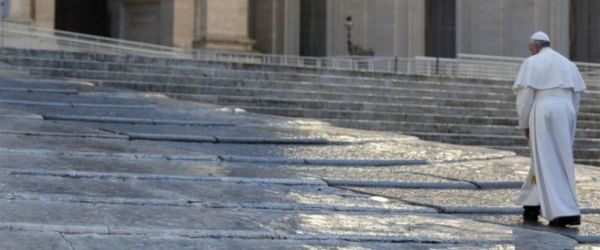Today’s liturgy presents us with another passage of the Sermon on the Mount, which we find in the Gospel of Matthew (cf. 5:17-37). In this passage, Jesus wants to help his listeners to reread the Mosaic law. What had been said in the ancient covenant was true, but that was not all: Jesus came to bring to fulfillment and to promulgate in a definitive way the Law of God, up to the last iota (cf. v. 18). He manifests its original aims and fulfils its authentic aspects, and he does all this through his preaching and, even more, with the offering of himself on the Cross. In this way, Jesus teaches how to fully carry out God’s will, and he uses these words: with a ‘righteousness’ that ‘exceeds’ that of the scribes and the Pharisees (cf. v. 20). A righteousness enlivened by love, charity, mercy, and hence capable of fulfilling the substance of the commandments, avoiding the risk of formalism. Formalism: this I can, this I cannot; up to this point I can, up to this point I cannot.... No: more, more.
In particular, in today’s Gospel, Jesus examines three aspects, three commandments [that regard] murder, adultery and swearing.
With regard to the commandment ‘you shall not kill’, he states that it is violated not only by murder in effect, but also by those behaviours that offend the dignity of the human person, including insulting words (cf. v. 22). Of course, these insulting words do not have the same gravity and culpability as killing, but they are set along the same line, because they are the pretext to it and they reveal the same malevolence. Jesus invites us not to establish a ranking of offences, but to consider all of them damaging, inasmuch as they are driven by the intent to do harm to one’s neighbour. Jesus gives an example. Insulting: we are accustomed to insulting; it is like saying “good morning”. And that is on the same line as killing. One who insults his brother, in his heart kills his brother. Please do not insult! We do not gain anything....
Another fulfillment is generated by the matrimonial law. Adultery was considered a violation of man’s property right over the woman. Instead, Jesus goes to the root of the evil. As one comes to killing through injuries, offences and insults, in this way one reaches adultery through covetous intentions in regard to a woman other than one’s own wife. Adultery, like theft, corruption and all the other sins, are first conceived in the depth of our being and, once the wrong choice is made in the heart, it is carried out in concrete behaviour. Jesus says: one who looks with a covetous spirit at a woman who is not his own is an adulterer in his heart, has set off on the path towards adultery. Let us think a little bit about this: about the wicked thoughts that go along this line.
Jesus then tells his disciples not to swear, as swearing is a sign of the insecurity and duplicity with which human relationships unfold. God’s authority is exploited so as to guarantee our human narrative. Instead, we are called to establish among ourselves, in our families and in our communities, a climate of clarity and mutual trust, so that we can be considered sincere without resorting to greater tactics in order to be believed. Mistrust and mutual suspicion always threaten peace!
May the Virgin Mary, a woman of listening and joyful obedience, help us to draw ever closer to the Gospel, to be Christians not ‘of façade’, but of substance! This is possible with the grace of the Holy Spirit, who allows us to do everything with love, and thus to wholly fulfil the will of God.
[Pope Francis, Angelus 12 February 2017]












